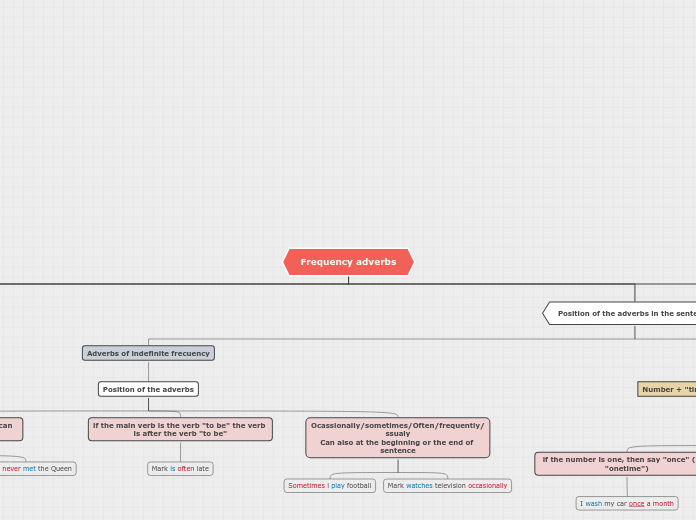Frequency adverbs
Adverb definition
gives more information about the verb
Example
without an adverb
Sara is walking
with an adverb
sara is walking quickly
types of adverbs
Adverbs of indefinite frequency
Always
100%
Frequently
90%
Ussually
80%
Often
70%
sometimes
50%
Occasionally
40%
Subtopic
Seldom
20%
Rarely/Hardly ever
10%
never
0%
Adverb of definite frequency
Describe the exact frequency of an action
Day
Week
Month
Year
Morning
Evening
Night
Week
Fortnight
Position of the adverbs in the sentence
Adverbs of indefinite frecuency
Position of the adverbs
all the adverbs of indefinite frecuency can go before the main verb
I always play football
Jane seldom drinks alcohol
I have never met the Queen
if the main verb is the verb "to be" the verb is after the verb "to be"
Mark is often late
Ocassionally/sometimes/Often/frequently/ssualy
Can also at the beginning or the end of sentence
Sometimes i play football
Mark watches television occasionally
Adverb of definite frequency
Number + "times" + "a" + period of time
Example
if the number is one, then say "once" (not "onetime")
I wash my car once a month
if the number ostime is two, the we say "twice" (not "two times")
I go to London twice a year
"every" + period of time
Example
Jane calls her mother every day
Marks goes to the beach every day
"on" + day of the week
example
Andrew watches football on saturdays
my parents go to the cinema on Wednesdays
Asking a question about frequency
"how often" + question form of verb
example
How often do you play football?
How often does MArk wash his car?
When you lived in London, how often did it rain?
How often wil you write to me
